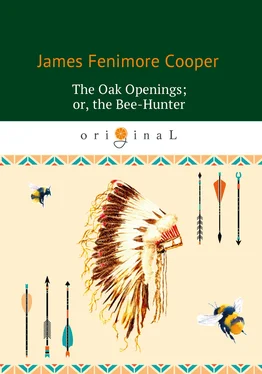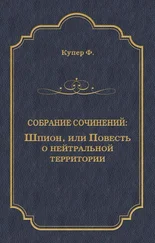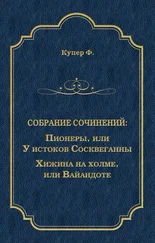James Fenimore Cooper
The Oak Openings; or, the Bee-Hunter
© T8RUGRAM, оформление, 2018
© Original, 2018
* * *
It ought to be matter of surprise how men live in the midst of marvels, without taking heed of their existence. The slightest derangement of their accustomed walks in political or social life shall excite all their wonder, and furnish themes for their discussions, for months; while the prodigies that come from above are presented daily to their eyes, and are received without surprise, as things of course. In a certain sense, this may be well enough, inasmuch as all which comes directly from the hands of the Creator may be said so far to exceed the power of human comprehension, as to be beyond comment; but the truth would show us that the cause of this neglect is rather a propensity to dwell on such interests as those over which we have a fancied control, than on those which confessedly transcend our understanding. Thus is it ever with men. The wonders of creation meet them at every turn, without awakening reflection, while their minds labor on subjects that are not only ephemeral and illusory, but which never attain an elevation higher than that the most sordid interests can bestow.
For ourselves, we firmly believe that the finger of Providence is pointing the way to all races, and colors, and nations, along the path that is to lead the east and the west alike to the great goal of human wants. Demons infest that path, and numerous and unhappy are the wanderings of millions who stray from its course; sometimes in reluctance to proceed; sometimes in an indiscreet haste to move faster than their fellows, and always in a forgetfulness of the great rules of conduct that have been handed down from above. Nevertheless, the main course is onward; and the day, in the sense of time, is not distant, when the whole earth is to be filled with the knowledge of the Lord, “as the waters cover the sea.”
One of the great stumbling-blocks with a large class of well-meaning, but narrow-judging moralists, are the seeming wrongs that are permitted by Providence, in its control of human events. Such persons take a one-sided view of things, and reduce all principles to the level of their own understandings. If we could comprehend the relations which the Deity bears to us, as well as we can comprehend the relations we bear to him, there might be a little seeming reason in these doubts; but when one of the parties in this mighty scheme of action is a profound mystery to the other, it is worse than idle, it is profane, to attempt to explain those things which our minds are not yet sufficiently cleared from the dross of earth to understand. Look at Italy, at this very moment. The darkness and depression from which that glorious peninsula is about to emerge are the fruits of long-continued dissensions and an iron despotism, which is at length broken by the impulses left behind him by a ruthless conqueror, who, under the appearance and the phrases of Liberty, contended only for himself. A more concentrated egotism than that of Napoleon probably never existed; yet has it left behind it seeds of personal rights that have sprung up by the wayside, and which are likely to take root with a force that will bid defiance to eradication. Thus is it ever, with the progress of society. Good appears to arise out of evil, and the inscrutable ways of Providence are vindicated by general results, rather than by instances of particular care. We leave the application of these remarks to the intelligence of such of our readers as may have patience to peruse the work that will be found in the succeeding pages.
We have a few words of explanation to say, in connection with the machinery of our tale. In the first place, we would remark, that the spelling of “burr-oak,” as given in this book, is less our own than an office spelling. We think it should be “bur-oak,” and this for the simple reason, that the name is derived from the fact that the acorn borne by this tree is partially covered with a bur. Old Sam Johnson, however, says that “burr” means the lobe, or lap of the ear; and those who can fancy such a resemblance between this and the covering of our acorn, are at liberty to use the two final consonants. Having commenced stereotyping with this supernumerary, for the sake of uniformity that mode of spelling, wrong as we think it, has been continued through-out the book.
There is nothing imaginary in the fertility of the West. Personal observation has satisfied us that it much surpasses anything that exists in the Atlantic States, unless in exceptions, through the agency of great care and high manuring, or in instances of peculiar natural soil. In these times, men almost fly. We have passed over a thousand miles of territory within the last few days, and have brought the pictures at the two extremes of this journey in close proximity in our mind’s eye. Time may lessen that wonderful fertility, and bring the whole country more on a level; but there it now is, a glorious gift from God, which it is devoutly to be wished may be accepted with due gratitude and with a constant recollection of his unwavering rules of right and wrong, by those who have been selected to enjoy it.
June, 1848.
How doth the little busy bee
Improve each shining hour,
And gather honey all the day,
From every opening flower.
Watts’ Hymns for children
We have heard of those who fancied that they beheld a signal instance of the hand of the Creator in the celebrated cataract of Niagara. Such instances of the power of sensible and near objects to influence certain minds, only prove how much easier it is to impress the imaginations of the dull with images that are novel, than with those that are less apparent, though of infinitely greater magnitude. Thus it would seem to be strange indeed, that any human being should find more to wonder at in any one of the phenomena of the earth, than in the earth itself; or should especially stand astonished at the might of Him who created the world, when each night brings into view a firmament studded with other worlds, each equally the work of His hands!
Nevertheless, there is (at bottom) a motive for adoration, in the study of the lowest fruits of the wisdom and power of God. The leaf is as much beyond our comprehension of remote causes, as much a subject of intelligent admiration, as the tree which bears it: the single tree confounds our knowledge and researches the same as the entire forest; and, though a variety that appears to be endless pervades the world, the same admirable adaptation of means to ends, the same bountiful forethought, and the same benevolent wisdom, are to be found in the acorn, as in the gnarled branch on which it grew.
The American forest has so often been described, as to cause one to hesitate about reviving scenes that might possibly pall, and in retouching pictures that have been so frequently painted as to be familiar to every mind. But God created the woods, and the themes bestowed by his bounty are inexhaustible. Even the ocean, with its boundless waste of water, has been found to be rich in its various beauties and marvels; and he who shall bury himself with us, once more, in the virgin forests of this widespread land, may possibly discover new subjects of admiration, new causes to adore the Being that has brought all into existence, from the universe to its most minute particle.
The precise period of our legend was in the year 1812, and the season of the year the pleasant month of July, which had now drawn near to its close. The sun was already approaching the western limits of a wooded view, when the actors in its opening scene must appear on a stage that is worthy of a more particular description.
Читать дальше












